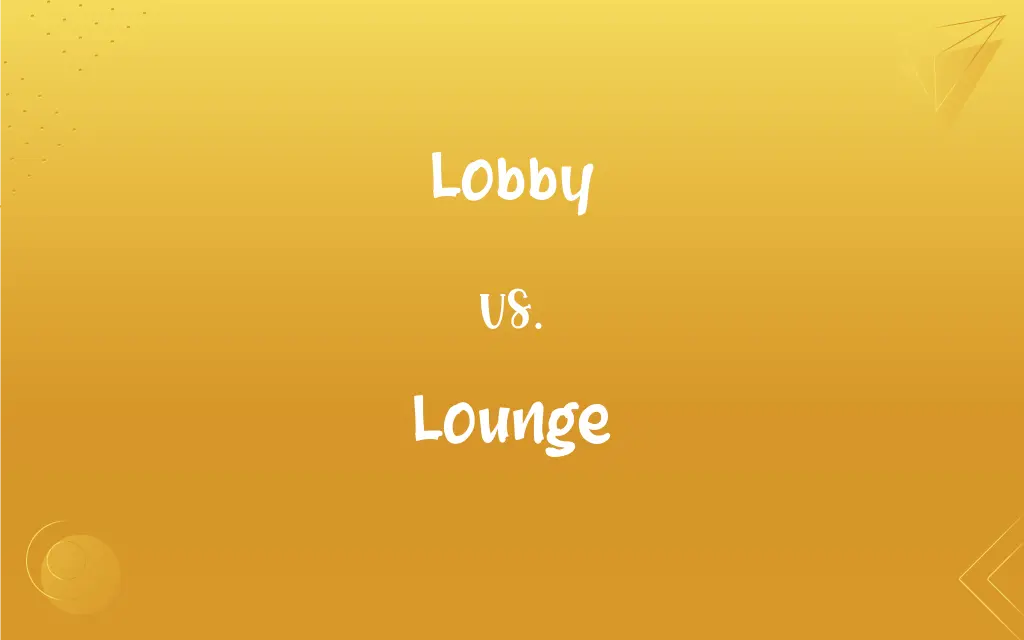Lobby vs. Lounge: What's the Difference?
Edited by Aimie Carlson || By Harlon Moss || Published on November 14, 2023
A lobby is an entrance hall or public space in a building, while a lounge is a room for sitting, relaxing, or waiting.

Key Differences
The lobby is typically the first space you encounter in a building, often used for access or transition. It serves as a public area where people can enter, exit, or meet.
A lounge, on the other hand, is designed for relaxation and leisure. It’s often furnished with comfortable seating and amenities to facilitate unwinding or socializing.
Lobbies are found in various buildings like hotels, offices, and theaters, serving as a gateway to other areas. They can be grand and formal or simple and functional.
Lounges are more intimate and casual, found in places like airports, clubs, or homes. They are dedicated to comfort and often feature cozy furniture and entertainment options.
While a lobby is about movement and access, a lounge is about stillness and enjoyment. Both serve important, albeit different, roles in the architecture of spaces.
ADVERTISEMENT
Comparison Chart
Primary Function
Access, transition
Relaxation, socializing
Location
Entrance of buildings
Within buildings, clubs, homes
Atmosphere
Formal, functional
Casual, comfortable
Furniture
Minimal, functional
Plentiful, cozy
Purpose
Movement, meeting point
Resting, leisure
ADVERTISEMENT
Lobby and Lounge Definitions
Lobby
Public Area.
He waited in the hotel lobby.
Lounge
Waiting Area.
The airport lounge was comfortable.
Lobby
Entrance Hall.
The grand lobby welcomed guests.
Lounge
Social Space.
Friends chatted in the lounge.
Lobby
Transitional Space.
The lobby led to several offices.
Lounge
Relaxation Room.
She read a book in the lounge.
Lobby
Meeting Point.
They gathered in the theater lobby.
Lounge
Leisure Area.
The club's lounge was elegantly decorated.
Lobby
Reception Area.
The lobby was bustling with activity.
Lounge
Comfortable Seating Area.
The lounge had plush sofas.
Lobby
A hall, foyer, or waiting room at or near the entrance to a building, such as a hotel or theater.
Lounge
To move or act in a lazy, relaxed way; loll
Lounging on the sofa.
Lounged around in pajamas.
Lobby
A public room next to the assembly chamber of a legislative body.
Lounge
To pass time idly
Lounged in Venice till June.
Lobby
A group of persons engaged in trying to influence legislators or other public officials in favor of a specific cause
The banking lobby.
The labor lobby.
FAQs
Do lobbies have seating?
Often, but usually limited.
Are lobbies always at the front?
Typically, as they're entry points.
What is a lobby in a hotel?
The entrance area where guests arrive.
Is food served in lounges?
Often, especially light snacks.
Can a lounge have a bar?
Yes, many lounges offer drinks.
Do all buildings have lobbies?
Most public buildings do.
Are lobbies used for events?
Sometimes, for receptions or gatherings.
Are lobbies noisy?
They can be, especially in busy places.
Do lobbies need security?
In some buildings, for safety.
Do lounges have dress codes?
Some, particularly exclusive ones.
Is Wi-Fi common in lounges?
Yes, for guest convenience.
Can lounges be private?
Yes, like in clubs or VIP areas.
Do lounges have entertainment?
Yes, like TVs or music.
What's in a hotel lobby?
Reception, seating, sometimes a concierge.
Are lounges quiet?
They're designed for relaxation, so generally, yes.
Are lobbies decorated?
Often, to reflect the building’s style.
Do airport lounges have showers?
Some, for long-haul travelers.
Is smoking allowed in lounges?
Depends on the place and regulations.
Can you work in a lounge?
Yes, many are conducive to work.
What makes a good lobby?
Functionality, aesthetics, and comfort.
About Author
Written by
Harlon MossHarlon is a seasoned quality moderator and accomplished content writer for Difference Wiki. An alumnus of the prestigious University of California, he earned his degree in Computer Science. Leveraging his academic background, Harlon brings a meticulous and informed perspective to his work, ensuring content accuracy and excellence.
Edited by
Aimie CarlsonAimie Carlson, holding a master's degree in English literature, is a fervent English language enthusiast. She lends her writing talents to Difference Wiki, a prominent website that specializes in comparisons, offering readers insightful analyses that both captivate and inform.






































































